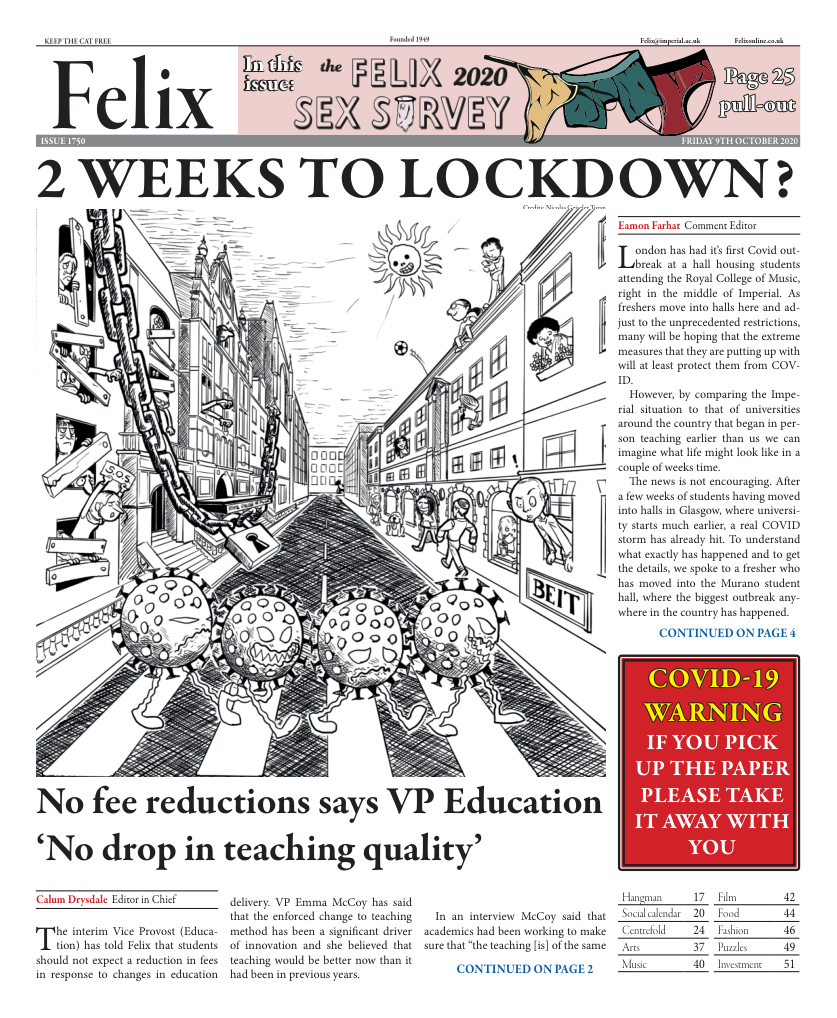College charges postgrads to apply ‘Financial gatekeeping’ say academics
Academics and researchers at Imperial signed an open letter addressed to the College senior leadership team calling the repeal of a new application fee for taught post-graduate courses.
Hundreds of academics and researchers at Imperial College London have signed an open letter addressed to the College’s senior leadership team calling for the repealing of a new application fee for taught post-graduate courses. Signatories accuse the College of “financial gatekeeping” and claim that the introduction of the £80 fee will “act as a direct barrier for underprivileged students”. The move comes just weeks after the University of Oxford resolved to scrap their post-graduate application fees, which had been in place since 2007, with the congregation there specifically citing “the undermining of diversity efforts” and “discrimination”.
Many are surprised by the timing of the decision, especially given Imperial’s specifi c context. According to the most recent Times Good University Guide, Imperial ranks 5th lowest in the country for social inclusion, with a particularly low percentage of state-school-educated students. The introduction of the fee puts Imperial squarely in the minority of Russell Group institutions – although such fees are more common in London. The open letter also stresses that the deci-sion is “important to consider in light of the recent work by the college to improve equality, specifically in response to the #BlackLivesMatter movement”, noting the “co-correlation of socioeconomic class and ethnicity, and associated disadvantage".
In an interview with Felix earlier this week, Profs Ian Walmsley and Emma McCoy of the senior leadership team explained the reasoning behind the implementation of the fee, saying that “appropriate” management of postgraduate applications is a “considerable cost”. They maintain that the measure won’t discourage anyone from applying, with Prof Walmsley saying that “we have funds which we can use as waivers if people aren’t able to cover the fee. We think that will mitigate the difficulty". Prof McCoy added that funding availability should stretch to any applicant “who meets our criteria for hardship. I don’t think this is about the College profiteering”.
Some members of academic staff disagree. Dr Dave Clements, deputy director of Physics MSc programs, shared his “distress” over the decision. “This will be a heavy burden for disadvantaged students. Even with waivers, these students will still be disadvantaged – they will have to go through the extra process of applying, which will further delay their application, and they could miss their place on high demand courses”. One of the authors of the open letter, Dr Ben Britton, expressed surprise over the timing of the move, particularly in light of the University of Oxford’s recent resolution to abolish their fee and the COVID-19 pandemic, saying “COVID restricts access to universities… When there is an imminent recession, education is turned to, and immediately we’re putting up a financial barrier to people even applying”.
Prof Chris Jackson, another of the authors, described what he thought the two-fold impact may be: “One part of it is inward-looking; I think a lot of staff and students will find it hard to trust Imperial when they make statements about BLM, or widening participation. And another part is to do with the external reputation, and impact on people applying”. He added that the College may miss out on “huge amounts of intellect and character” from dissuaded applicants.
It’s not just staff who oppose the measure: along with the academic signatories of the open letter are many students and alumni. Among them is Ben Fernando, who led the successful campaign at Oxford earlier this year and has organised a petition for Imperial alumni to voice opposition to the College’s move. He said “it’s incredibly sad that Imperial have taken this decision at a time when we should be reaffirming our commitment to equality and inclusion within the college. I hope fellow alumni will stand together on this issue and make clear that it’s not OK.”
Th e move has also called into question the transparency of the College’s decision-making processes. Dr Brit-ton says that he first heard about the fee in a tweet of a colleague mere days before its introduction, and Prof Jack-son recalls speaking to “passionate people at Imperial [involved in] widening participation” who were “completely blindsided” by the decision: “it clearly hadn’t been discussed as widely as it should have been”. The final decision was made at President’s Board, for which minutes are not made readily available and whose process is described as “opaque”.
The College hopes to prove these fears unfounded, with the official web-site promising that the waiver application process will be “swift and simple” and a pledging that it will “monitor the impact closely over the coming year”.







